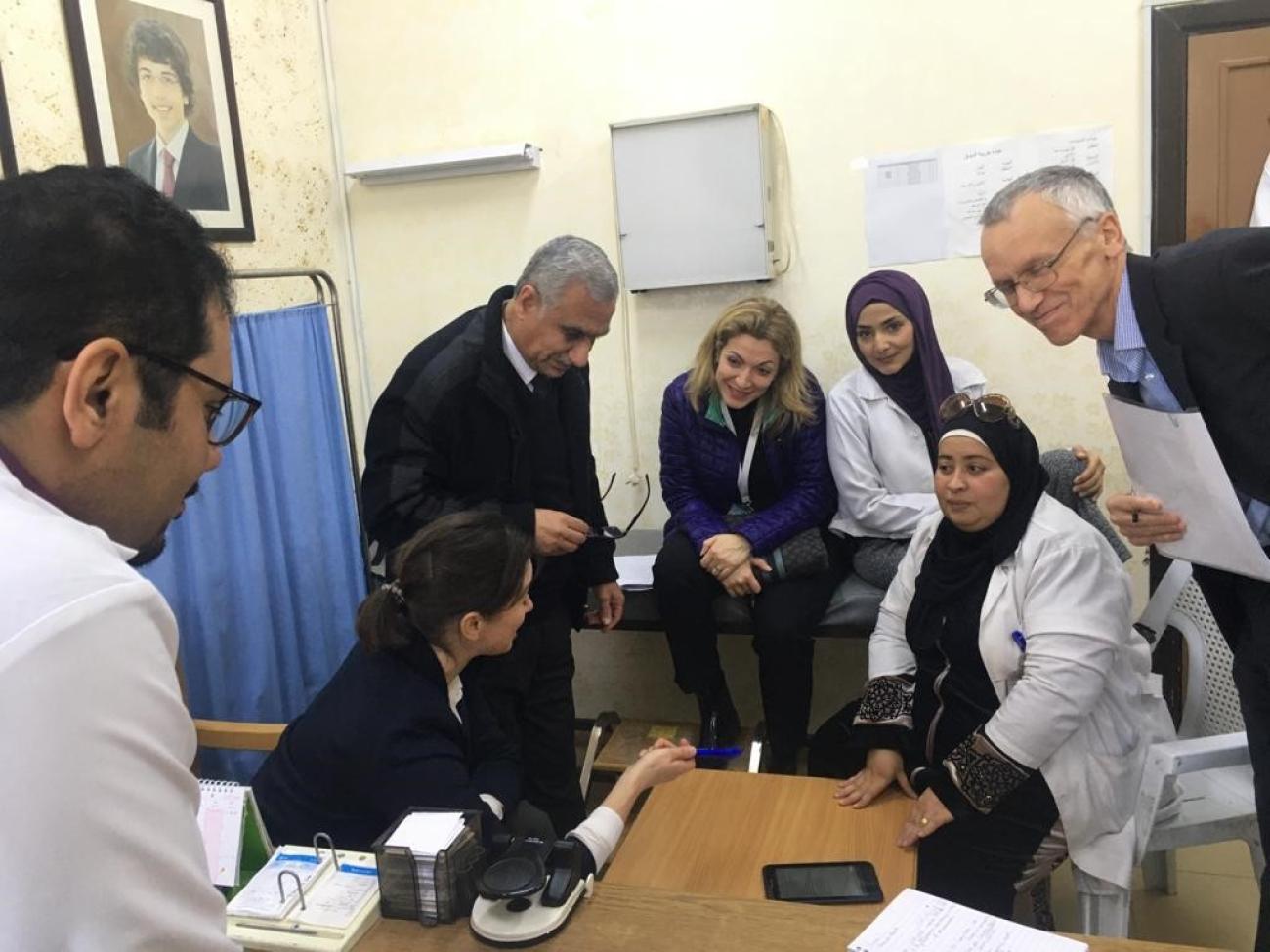WHO supports a strengthened response to cardiovascular diseases

In Jordan, noncommunicable diseases (NCDs) account for nearly 80% of total deaths, with cardiovascular diseases (CVDs) leading the ranking of deaths from NCDs.
Jordan’s National STEPwise Survey for Noncommunicable Diseases Risk Factors (2019) showed significant prevalence of hypertension, diabetes and CVD risk among adults (45-69 years old) at 52%, 20% and 25%, respectively.
The Jordan Ministry of Health in close collaboration with WHO has been implementing the WHO HEARTS technical package, which aims to strengthen prevention and control of CVDs at the primary care level through a comprehensive care package delivered to patients by health facility teams (doctors, nurses, technicians) that includes healthy lifestyle counselling, evidence-based treatment protocols, access to medicines and technology, risk based CVD management , team based care, and systems for monitoring.
HOW DID JORDAN DO IT, AND HOW DID THE WHO SECRETARIAT SUPPORT JORDAN?
The WHO HEARTS initiative comprises a multi-phase programme that aims at improving access to quality essential health services as it enables countries to strengthen their health systems to deliver on disease-specific service coverage results. The programme comprises a preparatory (pre-implementation) phase which leads into an implementation phase followed by scaling-up of the programme. Effective implementation of the package has been shown to improve early detection and control of patients with CVD risk factors (that is hypertension, diabetes and high cardiovascular disease risk).
Since 2019, the Jordan Ministry of Health with technical and financial support from WHO accomplished several activities towards the implementation of the HEARTS programme. A steering committee and a technical committee were established to oversee implementation of the programme. Later, the development of consensus-based, evidence-based clinical guidance for CVD risk assessment, hypertension and diabetes management at the primary care level, tailored to local context was undertaken. This was followed by building capacities of health care providers on implementation of HEARTS which was initiated in Jordan in 2021. With the programme’s expansion in 2022, the aim is to include all physicians and nurses in health care centers throughout the country; almost 1500 health care professionals in 500 centers. This effort was preceded by the development of a comprehensive training package based on the WHO HEARTS technical package, in both Arabic and English languages. The training package details patient counseling on lifestyle modification, clinical management of CVD risk factors, team-based care, monitoring of patient outcome and service delivery. WHO supported the Ministry of Health in training 18 physician and 6 nurse trainers who will be rolling out training on the HEARTS programme throughout the country.
Furthermore, WHO conducted baseline assessments of pilot health care centers to evaluate their readiness to implement the HEARTS programme, exploring the availability of health care workers, equipment, lab investigations, medicines, health care services, patient records, and other necessary prerequisites. Multiple gaps were uncovered through the assessments and work is in progress to effectively address them by Ministry of Health with technical WHO support. Interventions include enhancing task sharing and role distribution among medical team members. Initially, the assessment was conducted in six centers and will expand during 2022 to comprise all centers that will implement the HEARTS programme; over 100 centers in total.

Other areas for intervention receiving attention are improving the availability and maintenance of essential equipment and amending patient care pathways within clinics to enhance early detection of CVD risk factors. Also, optimizing clinical management, monitoring of patients and ensuring effective health care service delivery, in addition to strengthening existing patient records and health information systems are being addressed.
Among the key success factors to the implementation of the HEARTS programme is the strong commitment of the Ministry of Health as well as the continuous monitoring of its implementation at facility and national levels. Hence, WHO is supporting the Ministry of Health in developing clinical and programme performance monitoring indicators. These will be deployed to periodically assess the impact of the programme on the early detection and management of hypertension, diabetes, and cardiovascular disease risk. The results from these assessments will be used to further inform the implementation and scale-up of the programme throughout the country.
Strengthening response to cardiovascular diseases is a national health priority in light of the heavy burden of these diseases. The successful implementation of the WHO HEARTS programme is foreseen to improve the early detection and management of patients with CVD risk factors. Since it is provided at the primary care level, the HEARTS package enhances the integration of NCDs into primary care services contributing to a better coverage of a wider population of those living with NCDs. A key factor to success of the initiative is the political will contributing to continuous supervision and monitoring of its implementation which allows assessment of the current situation, identification of gaps, and making informed recommendations to address the root causes of these gaps and reform care.

